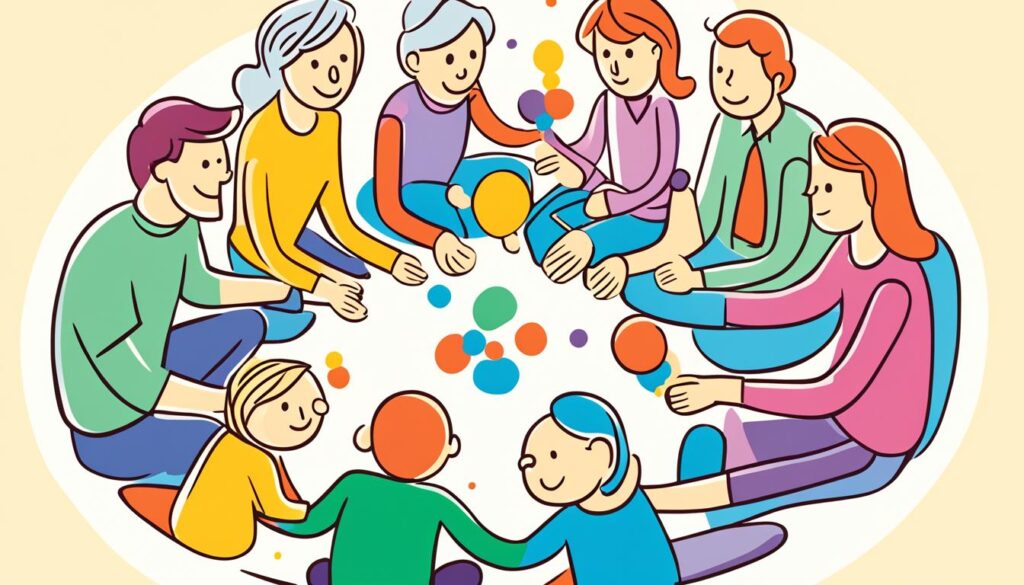From the start, family plays a key role in your life. It shapes your emotional health and personal growth. The family systems approach shows how each person affects the whole family.
This guide will cover family systems theory. It will explain its key ideas, how it helps, and how to start with a therapist.
Family systems therapy sees how closely connected family members are. It looks at the family, not just one person, to understand everyone’s role. This method helps create better family relationships for everyone’s benefit.
Table of Contents
ToggleWhat is Family Systems Therapy?
Family systems therapy looks at how each family member’s actions and relationships fit together. It helps us see how everyone in the family affects each other. This method focuses on changing family interactions for the better.
This therapy believes that people can’t be understood alone. They are deeply connected to their family’s relationships and patterns. Therapists use this idea to help families see and change the forces that shape their lives.
Family systems therapy shows how each person’s feelings and actions make up a family’s unique system. By understanding these connections, families can tackle problems, solve conflicts, and create a supportive environment. This helps everyone in the family grow and be happy.
If you want to make your family stronger, deal with tough times, or fix old issues, family systems therapy can help. It’s a deep way to improve family life. By looking at family dynamics closely, families can reach their full potential and build a better future together.
Core Principles of Family Systems Therapy
Family systems theory is the base of family systems therapy. It sees the family as a connected whole. This therapy has core principles that shape its view.
Triangles
Triangles are a big part of family systems therapy. They are three-person relationships within the family. These triangles help reduce tension between two people by adding a third.
Therapists use these dynamics to help families understand their complex relationships. They work on finding better ways for families to talk and support each other.
Differentiation of the Self
Differentiation of the self is another key idea. It means being able to keep your own identity and emotions in the family. People who are well-differentiated think and act on their own but still connect with their families.
This skill makes family systems therapy help people become more aware and strong against family issues. It’s about understanding how families work together and changing for the better.
Using these main ideas, therapists help families grow in understanding and change for the long term. They see how family members depend on each other and the patterns that affect them. This approach offers a complete and changing way forward.
Family systems therapy Techniques and Exercises
Family systems therapy uses many techniques and exercises to help families understand and improve their relationships. These methods involve everyone in the family. They aim to change negative behaviors and ways of talking into positive ones.
One key technique is the genogram, a chart that shows a family’s history and relationships. It helps families see patterns and where they come from. This can help them understand how these patterns affect their interactions now.
Family sculpting is another exercise where family members arrange themselves to show their roles and connections. This can reveal a lot about how they see themselves and each other.
Reframing lets families see their problems in a new, more positive way. Circular questioning helps them understand each other’s views and experiences better. Joining means the therapist works with the family to build trust and openness.
Boundary making, detriangulation, and enactments are also key in family systems therapy. These help families set clear boundaries, deal with complex relationships, and practice scenarios to improve talking and solving conflicts.
These techniques and exercises help families see patterns, express their feelings, talk better, and build stronger, more supportive relationships.

Family systems therapy is not the same for every family. The right techniques and exercises depend on the family’s unique needs and dynamics. Working with a skilled family therapist is important. They can guide you and help you see the benefits of family systems therapy.
Benefits of Family Systems Therapy
Family systems therapy helps families build stronger bonds and solve conflicts better. It creates a supportive space for everyone to grow and feel good. This type of therapy makes talking openly easier, helping family members understand each other better.
It also teaches skills for solving conflicts. This leads to more empathy and deeper connections within the family. Feeling safe and supported, families grow together, facing life’s ups and downs as a team.
Family systems therapy is great for improving how families talk to each other. It helps solve problems and make the family atmosphere more peaceful. This makes everyone feel closer and more emotionally secure.
This therapy does more than help individuals; it strengthens the whole family. It helps families deal with challenges better and creates a caring place for everyone. By using this approach, families can reach their full potential and support each other in thriving.
When to Use Family Systems Therapy
Family Systems Therapy is great for big life changes or crises in a family. This includes things like a divorce, the loss of a loved one, or big shifts that upset the family balance. It’s also useful when fights keep happening and talking things out is hard.
This therapy is super helpful when a family member, like a kid or teen, is struggling with behavior or mental health issues. It looks at how the family’s dynamics affect the person’s health. Then, it works to make the family environment healthier.
If you or your family are going through big changes, crises, or ongoing fights, or if someone is dealing with mental health problems, consider Family Systems Therapy.
This therapy looks at the whole family. It helps people and families deal with tough times, get better at talking, and build a stronger, more supportive family bond.
Research on Effectiveness
Studies show that family systems therapy is very effective. It helps with a wide range of issues. Families often see lasting positive changes in how they interact with each other.
This therapy is great for many problems. It helps with addiction, anger, anxiety, and more. Families can feel better and communicate better after therapy.
It also helps with depression, eating disorders, and parenting issues. People feel less anxious and depressed. They also get better at solving problems and understanding each other.
Conditions Addressed
Family systems therapy is good for many mental health issues. It’s useful for fixing communication and helping with substance abuse. It’s a key tool for families facing tough times.
- Addiction and substance abuse
- Anger management problems
- Anxiety
- Bipolar disorder
- Depression
- Dysfunctional relationships
- Eating disorders
- Infidelity and divorce
- Parenting issues

This therapy looks at the whole family to help with different issues. It shows how important family support is for mental health.
Getting Started with Family Systems Therapy
Starting your family’s healing journey with family systems therapy means finding the right therapist. You can make this easier with tools like Grow Therapy’s search feature. This tool helps you find therapists by looking at their qualifications, certifications, insurance, and availability. It makes sure you find someone who fits your family’s needs.
But it’s not just about finding a therapist. It’s also important to feel good about working with them. Grow Therapy’s provider finder helps you find therapists who are a good match for your family. This makes starting your therapy journey smoother and more rewarding.
Success in family systems therapy comes from finding a therapist who fits your family’s style and needs. By doing your homework and connecting with the right therapist, you can start a journey that strengthens your family. It also helps you face life’s challenges better and with more understanding.
How Family Systems Therapy Works
Family systems therapy is a team effort aimed at making family relationships healthier and improving how you talk to each other. In your first family systems therapy sessions, the therapist will learn about your family’s interactions, goals, and past. They use this info to create a plan just for your family’s needs.
For about 12 sessions, the therapist leads open talks in your family. Everyone gets to share their thoughts and feelings. This creates a safe space for family members to understand and support each other better.
The therapist uses tools like genograms, family sculpting, reframing, and enactments to understand your family’s habits and interactions. These tools help the therapist help your family change for the better and move towards a more positive family systems therapy process.
By tackling deep-seated issues and enhancing communication, family systems therapy can help your family face challenges and build stronger bonds. The therapist helps your family change, leading to more harmony and well-being.
Considerations and Challenges
Family systems therapy can be tough because it needs everyone in the family to work together. One big challenge is when family members don’t want to go to therapy. They might be scared of change, want things to stay the same, or don’t trust the therapist.
Therapists in family systems therapy must stay neutral. This helps them keep things fair and open. But, family members might see this as not supporting them or even okaying bad behavior. This can be hard when families want clear advice or help from the therapist.
Therapists also have to deal with the complex ways families interact and the power differences between members. They need to make sure everyone gets a chance to speak and be heard. It’s tricky to balance the needs and views of each person while helping the family work better together.
To overcome these hurdles, therapists use different methods, such as:
- Encouraging open and honest talk among family members
- Helping family members see and understand each other’s sides
- Getting family members to own up to their actions
- Creating ways to deal with resistance and build trust
With skill and care, family systems therapists can help families get past these issues and make lasting changes.
Conclusion
Family systems therapy offers a unique way to tackle family challenges. It sees your family as a connected system. This means every action and relationship affects everyone else.
This approach helps you understand and improve your family’s dynamics. It leads to better communication and conflict resolution. It also builds deeper emotional support and strengthens family ties.
Family systems therapy can change lives. It’s not just for dealing with crises. It’s for making your family’s life better overall. The methods and ideas of this therapy can lead to lasting changes for everyone.
This therapy shows how to handle family life’s complexities. It empowers you to make your family more supportive and happy. By using family systems therapy, you can grow personally and make your family stronger. You’ll create a place where everyone can thrive.
FAQ
What is family systems therapy?
Family systems therapy looks at how each family member affects the others. It sees the family as a system where everyone’s actions connect. This approach helps fix family problems by focusing on these connections.
What are the core principles of family systems therapy?
This therapy is built on two main ideas. First, it sees relationships as triangles, not just between two people. Second, it teaches people to balance their own needs with the family’s needs.
What techniques and exercises are used in family systems therapy?
Therapists use many tools like genograms and family sculpting. They also use reframing and circular questioning. These help families understand and improve their interactions.
What are the benefits of family systems therapy?
This therapy helps families talk better and solve conflicts. It also strengthens family ties and helps them face challenges together.
When is family systems therapy most effective?
It works best during big changes or when there are ongoing fights. It’s also good when one family member has mental health issues. It looks at how family dynamics affect these issues.
What does the research say about the effectiveness of family systems therapy?
Studies show it helps with many issues like addiction and depression. It also helps with eating disorders and parenting problems.
How can I find the right family systems therapist for my family?
Use tools like Grow Therapy’s search to find a therapist. Look for qualifications, insurance, and how well they fit with your family.
What can I expect during a family systems therapy session?
In the first session, the therapist will learn about your family and goals. They will guide discussions and use techniques to help everyone share and understand each other better.
What are some of the challenges in family systems therapy?
Some challenges include family members not wanting to change. Therapists must stay neutral but avoid seeming to take sides. It’s hard to deal with the complex family dynamics.
Source Links
About The Author

Medically reviewed by Dr. Chandril Chugh, MD, DM (Neurology)
Dr. Chandril Chugh is a U.S.-trained, board-certified neurologist with expertise in diagnosing and managing neurological disorders, including migraines, epilepsy, Parkinson’s disease, and movement disorders. His clinical focus includes evidence-based neurological care and patient education.
All content is reviewed for medical accuracy and aligned with current neurological guidelines.




